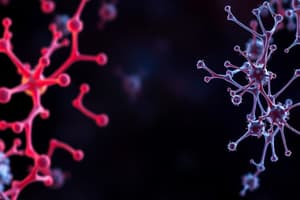Podcast
Questions and Answers
What type of immunity is characterized by the individual producing antibodies after immunization or infection?
What type of immunity is characterized by the individual producing antibodies after immunization or infection?
- Passive immunity
- Natural immunity
- Active immunity (correct)
- Innate immunity
Which of the following is an example of passive immunity?
Which of the following is an example of passive immunity?
- Gamma globulin injections (correct)
- T cell response
- Immunization with a vaccine
- Exposure to a pathogen
Which type of immunity does NOT involve memory?
Which type of immunity does NOT involve memory?
- Natural immunity
- Passive immunity (correct)
- Active immunity
- Adaptive immunity
What is an example of an endogenous non-specific immune response?
What is an example of an endogenous non-specific immune response?
Which type of immunity is primarily involved when transferring antibodies from mother to fetus?
Which type of immunity is primarily involved when transferring antibodies from mother to fetus?
What is the primary function of antibodies?
What is the primary function of antibodies?
Which type of immunity is characterized by immediate response to pathogens?
Which type of immunity is characterized by immediate response to pathogens?
What distinguishes adaptive immunity from innate immunity?
What distinguishes adaptive immunity from innate immunity?
Which cells are primarily involved in humoral-mediated immunity?
Which cells are primarily involved in humoral-mediated immunity?
What is meant by 'phagocytosis' in the context of the immune system?
What is meant by 'phagocytosis' in the context of the immune system?
Which of the following is NOT a characteristic of adaptive immunity?
Which of the following is NOT a characteristic of adaptive immunity?
What role do leukocytes play in the immune system?
What role do leukocytes play in the immune system?
Which of the following best describes 'innate immunity'?
Which of the following best describes 'innate immunity'?
What is an antigen's primary role in the immune response?
What is an antigen's primary role in the immune response?
What term describes the immunity that is passed from mother to child through breastfeeding?
What term describes the immunity that is passed from mother to child through breastfeeding?
Flashcards
Innate Immunity
Innate Immunity
Body's first line of defense against infection, characterized by a rapid, non-specific response.
Adaptive Immunity
Adaptive Immunity
Body's acquired ability to recognize and neutralize specific pathogens, often with a stronger and faster response upon re-exposure.
Humoral Immunity
Humoral Immunity
Antigen-specific immune response, mediated by antibodies produced by B cells and plasma cells.
Cell-Mediated Immunity
Cell-Mediated Immunity
Signup and view all the flashcards
Antigen
Antigen
Signup and view all the flashcards
Antibody
Antibody
Signup and view all the flashcards
Phagocytosis
Phagocytosis
Signup and view all the flashcards
Active Immunity
Active Immunity
Signup and view all the flashcards
Passive Immunity
Passive Immunity
Signup and view all the flashcards
Immunology
Immunology
Signup and view all the flashcards
Active Immunity Example
Active Immunity Example
Signup and view all the flashcards
Passive Immunity Example
Passive Immunity Example
Signup and view all the flashcards
Study Notes
Innate Immunity vs Adaptive Immunity
- Innate immunity is non-specific, acting as the first line of defense against pathogens.
- Adaptive immunity is specific, remembering prior exposures to pathogens.
- Innate immunity has a fast response time, while adaptive immunity is slower.
- Innate immunity has low potency, where adaptive immunity has high potency.
- Innate immunity lacks memory, while adaptive immunity has memory of pathogens.
Definition of Terms
- Immunology: The study of the body's reactions to foreign substances.
- Immunity: Resistance to disease, specifically infectious disease. It's the body's defense mechanisms against foreign substances and pathogens.
- Innate Immunity: Body's natural ability to fight against pathogens (non-specific)
- Adaptive Immunity: Immunity that's acquired or strengthened after specific exposure to pathogens (specific)
- Antigens: Substances that provoke an immune response.
- Immunogens: Any substance that induces an immune response.
- Antibodies: Proteins produced by the immune system in response to an antigen.
- Phagocytosis: The process of cells engulfing and destroying pathogens.
Cells Involved
- Leukocytes: White blood cells. Include macrophages, mast cells, dendritic cells, B cells, T cells, and NK cells.
- B cells: Produce antibodies
- T cells: A crucial part of adaptive immunity, with various subtypes (helper, cytotoxic, regulatory).
- NK cells: Kill infected cells directly without prior exposure to the specific pathogen.
Immunity
- Innate examples: physical barriers (skin, mucous membranes), chemical barriers (pH, enzymes); cellular responses (macrophages, neutrophils).
- Adaptive examples: cell-mediated immunity (T cell responses); antibody-mediated immunity (B cell responses leading to antibody production).
Types of Immunity (Active/Passive)
- Active immunity: Develops after exposure to a pathogen or through vaccination, producing memory cells.
- Passive immunity: Temporary immunity provided by antibodies produced by another source, like from mother to child.
Lymphocytes
- Types: T cells, B cells, NK cells
- Functions: Different types are responsible for different aspects of immunity.
- T-helper cells
- T-cytotoxic Cells:
- B-cells: Produce antibodies
- Natural Killer (NK) cells: Kill virus-infected cells and tumor cells.
Other Cells
- Monocytes
- Macrophages
- Mast cells
- Dendritic cells
Other Information
- Different parts of the immune response, like the external and internal defense systems, are important for overall health.
Studying That Suits You
Use AI to generate personalized quizzes and flashcards to suit your learning preferences.




